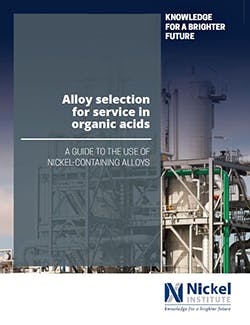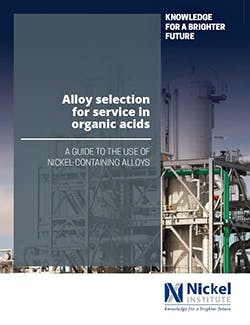Nickel Institute Technical Guide Helps Engineers With Alloy Selection
The Nickel Institute publishes the latest in a series of updated technical publications aimed at helping engineers and specifiers select corrosion resistant materials. “Alloy selection for service in organic acids,” (10063), reviews the corrosive effect of organic acids, such as formic, acetic and fatty acids at all concentrations. The corrosive action of organic acids is complicated because these acids are not handled in isolation but rather as process mixtures with inorganic acids, organic solvents and salts.
"Organic acids rank among the most important chemicals in industry today," says Nickel Institute's Geir Moe P.Eng, who revised the publication. "Rather than being used as final products, they serve as a precursor for other chemicals. They are the building block for many compounds, ranging from drugs and pharmaceuticals, such as aspirin, to plastics and fibres."
This fully revised technical publication from the Nickel Institute provides a useful guide for materials engineers and is available for free download. “Alloy selection for service in organic acids” is part of an extensive library of free-to-download technical guides intended to enable confident use of nickel-containing materials. Recent companion publications in the series include “Alloy selection for service in caustic soda - a guide to nickel-containing alloys,” “Alloy selection for service in sulphuric acid” and “Alloy selection for service in hydrogen fluoride, hydrofluoric acid and fluorine.”
The Nickel Institute also offers a free online technical inquiry service. A team of highly experienced experts is on hand to answer technical questions from existing and potential users of nickel-containing materials for architecture, building & construction, welding, process engineering, structural engineering and other related topics.
For more information, visit: www.nickelinstitute.org

